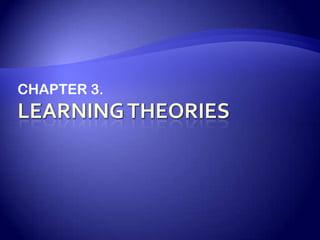
Chapter 3 2 learning theories
- 2. Learning and Teaching We want children to be actively engaged in learning. (the construction of knowledge in specific situations) Teachers work with children whose cognitive abilities are developing. (the general growth and change of cognitive structures) Learning theories are used to inform teacher practice.
- 3. Learning Theories Piaget Vygotsky and Social Cognition Constructivism Multiple Intelligences
- 4. Piaget’s Theory of Learning Piaget's theory is based on the idea that the developing child builds cognitive structures . The development of understanding takes place across 4 age-related stages.
- 5. Piaget’s Developmental Stages Sensorimotor stage (birth - 2 years old): The child, through physical interaction with his or her environment, builds a set of concepts about reality and how it works. This is the stage where a child does not know that physical objects remain in existence even when out of sight (object permanence). http://www.youtube.com/watch?v=NjBh9ld_yIo&feature=related Preoperational stage (ages 2-7): The child is not yet able to conceptualize abstractly and needs concrete physical situations. (conservation: aspects of the object/situation remain the same after transformation) http://www.youtube.com/watch?v=B65EJ6gMmA4
- 6. Piaget’s Developmental Stages Concrete operations (ages 5-11): As physical experience accumulates, the child starts to conceptualize, creating logical structures that explain his or her physical experiences. Abstract problem solving is also possible at this stage. For example, arithmetic equations can be solved with numbers, not just with objects. http://www.youtube.com/watch?v=YJyuy4B2aKU Formal operations (beginning at ages 11-15): By this point, the child's cognitive structures are like those of an adult and include conceptual reasoning. Implications for teaching: Curriculum must be developmentally appropriate and instruction must take place within the context of development.
- 7. Vygotsky and Social Cognition “one child could, with cooperation, solve problems designed for 12 year olds, while the other could not go beyond problems intended for 9 year olds” Culture is a significant factor in development – 1) what is learned and 2) how it is learned (tools of intellectual adaptation) Dialogue is critical to learning Scaffolding – where the adult continually adjusts the level of his or her help in response to the child's level of performance Zone of proximal development – the difference that exists between what child can do on her own and what the child can do with help
- 8. Constructivism Philosophy of learning where learners construct their own understanding of the world. Process of learning is the search for meaning. Meaning is understanding the whole as well as the parts. Children construct meaning by connecting and combining prior information with new information. Learning is a process of adjusting our mental models to accommodate new experiences.
- 9. Multiple Intelligences Howard Gardner proposed 7 ways that people perceive & understand the world. Present curriculum favors the verbal-linguistic and logical-mathematical intelligences. Believes that curriculum should reflect these 7 intelligences allowing all students to learn through role playing, cooperative learning, reflection, visualization, etc.
- 10. Multiple Intelligences cont. Verbal-Linguistic: The ability to use words and language. Logical-Mathematical: The capacity for inductive and deductive thinking and reasoning, as well as the use of numbers and the recognition of abstract patterns . Visual-Spatial: The ability to visualize objects and spatial dimensions, and create internal images and pictures. Body-Kinesthetic: The wisdom of the body and the ability to control physical motion.
- 11. Multiple Intelligences cont. Body-Kinesthetic: The wisdom of the body and the ability to control physical motion. Musical-Rhythmic: The ability to recognize tonal patterns and sounds, as well as a sensitivity to rhythms and beats. Interpersonal: The capacity for person-to-person communications and relationships. Intrapersonal: The spiritual, inner states of being, self-reflection, and awareness. http://literacyworks.org/mi/assessment/findyourstrengths.html http://literacyworks.org/mi/assessment/cgi-bin/results.cgi
- 12. Shaw, D. G., et al. (2000). Science fairs for all. Science & Children, 38(3), 14-19.
- 13. What does this mean for teaching science? Science is understanding the natural world. For children to learn science teachers must: Allow multiple experiences for children to learn a concept Be able to modify experiences to meet developmental abilities Provide for learning in social venues that support dialogues